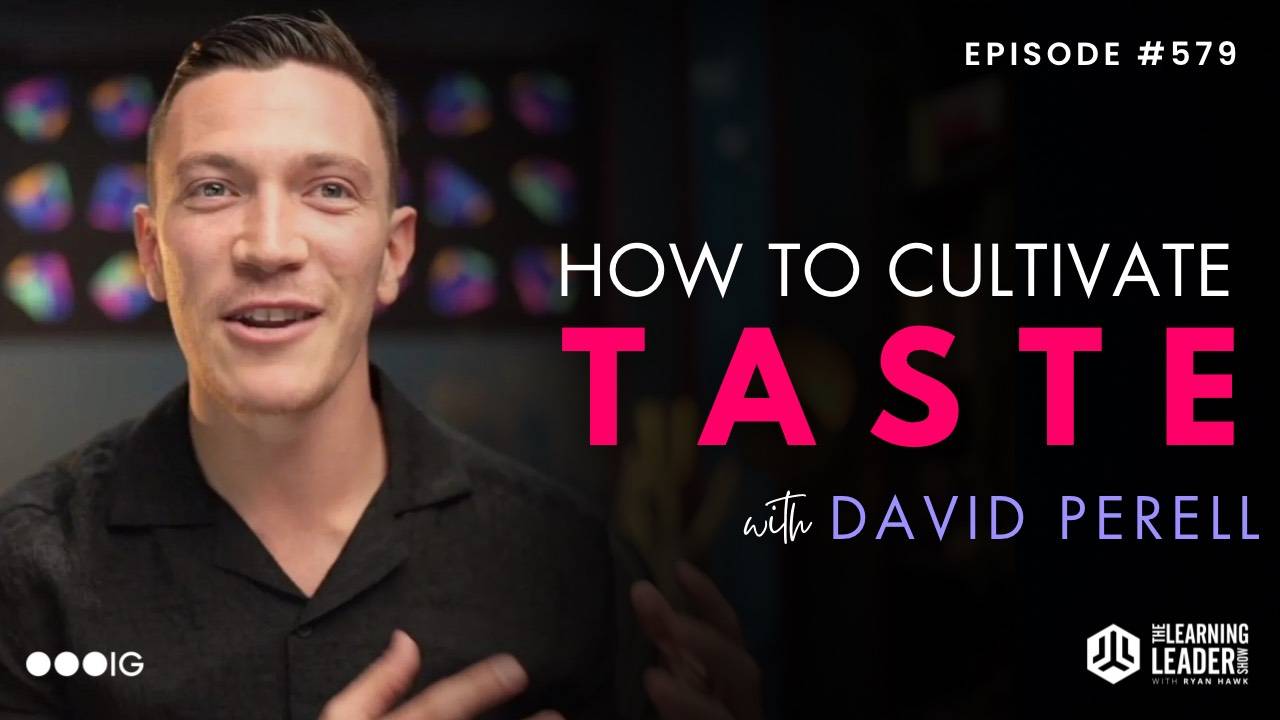David Perell is the founder and CEO of Write of Passage. He’s taught thousands of people from more than 70 countries how to become a more effective writer. Additionally, he’s the host of the How I Write Podcast where he interviews the world’s greatest writers and goes inside their process.
WATCH this conversation on YouTube. And SUBSCRIBE!
Order our NEW BOOK, The Score That Matters. “People spend far too much time obsessing about external scoreboards and not nearly enough time thinking about their internal one. Hawk and Cupps offer an important corrective, arguing the most important measure is whether or not you are living in alignment with your core values.” — Brad Stulberg, Best-Selling Author of Master of Change
Be part of “Mindful Monday” — Text Hawk to 66866
The Learning Leader Show
- Set the standard – “It’s your job to have the highest quality standards of anybody you work with. Every day, you’ll face pressure to lower them. Don’t do it. If you can set a high standard and simply maintain it, you’ll do very well for yourself.”
- Have a high-quality bar. Do three things:
- Define it: Clearly state the standards. (read The 11 Laws of Showrunning)
- Maintain it: This is hard to do.
- Raise it: Keep pushing.
- You need to define what quality looks like. Set the true north.
- David worked with a coach to establish his core values. And he was going to narrow it down to five and the coach said, “Nope, it’s just one. It’s the one that everything in your life orbits around… It’s The Pursuit of Excellence.
- The biggest piece of low-hanging fruit for leaders is getting funnier:
- Nobody trains themselves to get funnier though. It’s strangely taboo. That’s why it’s such an opportunity.
- “Laughter is the sound of comprehension.” Say something memorable. Humor is memorable.
- A good way to think… Deconstruct something funny. David spends a lot of time understanding why Theo Von is so funny.
- The key to excellent storytelling: a moment of change. Conflict and suspense carry stories.
- Robert Caro writing the LBJ books… “What would I see if I was there.” He moved to where LBJ lived to see what it was like to be there.
- How to cultivate taste:
- Make a list of things you love/hate.
- Look for things you love (but aren’t supposed to), and things you hate (but are supposed to love).
- Make things. Don’t be a passive consumer. Be a connoisseur. Be discerning about what you consume.
- Amor Tolles – History is bad for knowing what’s good now.
- Consume old things.
- Museums – Pay attention to what elicits a reaction. Why is it a 10? Why is it a 1? What do you love? What do you hate? Why?
- Archegos is David’s favorite Greek word, and it gets to the heart of good leadership.
- Four meanings: Author, founder, pioneer, leader
- America’s founding fathers are the canonical example
- Lessons from a mysterious billionaire mentor:
- David asks very specific questions, listens, and takes lots of notes.
- When meeting with a mentor, show up with energy and specific questions. They are tired of hearing the boring generic questions. Be specific.
- The mentor talks 98% of the time and David just types what he says. He now has 18,000 words worth of notes. Some lessons:
- CEOs are Sloganeers: CEOs shouldn’t write strategy memos. They should drive slogans.
- Three lines. Three words each. (Bezos: Focus on the Customer)
- CEOs should tell the same stories over and over again, refining their pitch like a comedian.
- Gauging reactions
- Asking questions
- Listening to push-back
- Seeing what makes people’s eyes light up
- Your message is only landing once people start making fun of you.
- CEOs are Sloganeers: CEOs shouldn’t write strategy memos. They should drive slogans.
- Good goal in life: Always working, never working
- Story from Patrick O’Shaughnessy. He was asked how much time he spent preparing. Initially, he said, “not much.” Then he thought for a while, and said, “I’m preparing all the time. My whole life is preparing to ask these questions.”
- Apply to be in my Learning Leader Circle
- Read: The Pursuit Of Excellence
- Read: WELCOME TO MANAGEMENT
- Be part of “Mindful Monday” — Text HAWK to 66866
- Connect with me on LinkedIn
- Join our Facebook Group: The Learning Leader Community
- To Follow Me on Twitter: @RyanHawk12
Time Stamps
More Learning:
Episode 078: Kat Cole – From Hooters Waitress To President of Cinnabon
Episode 216: Jim Collins — How To Go From Good To Great
Episode #300: AJ & Keith Hawk – How To Instill Work Ethic & Curiosity In Your Children
Episode #303: General Stanley McChrystal – The New Definition Of Leadership



Leave A Comment